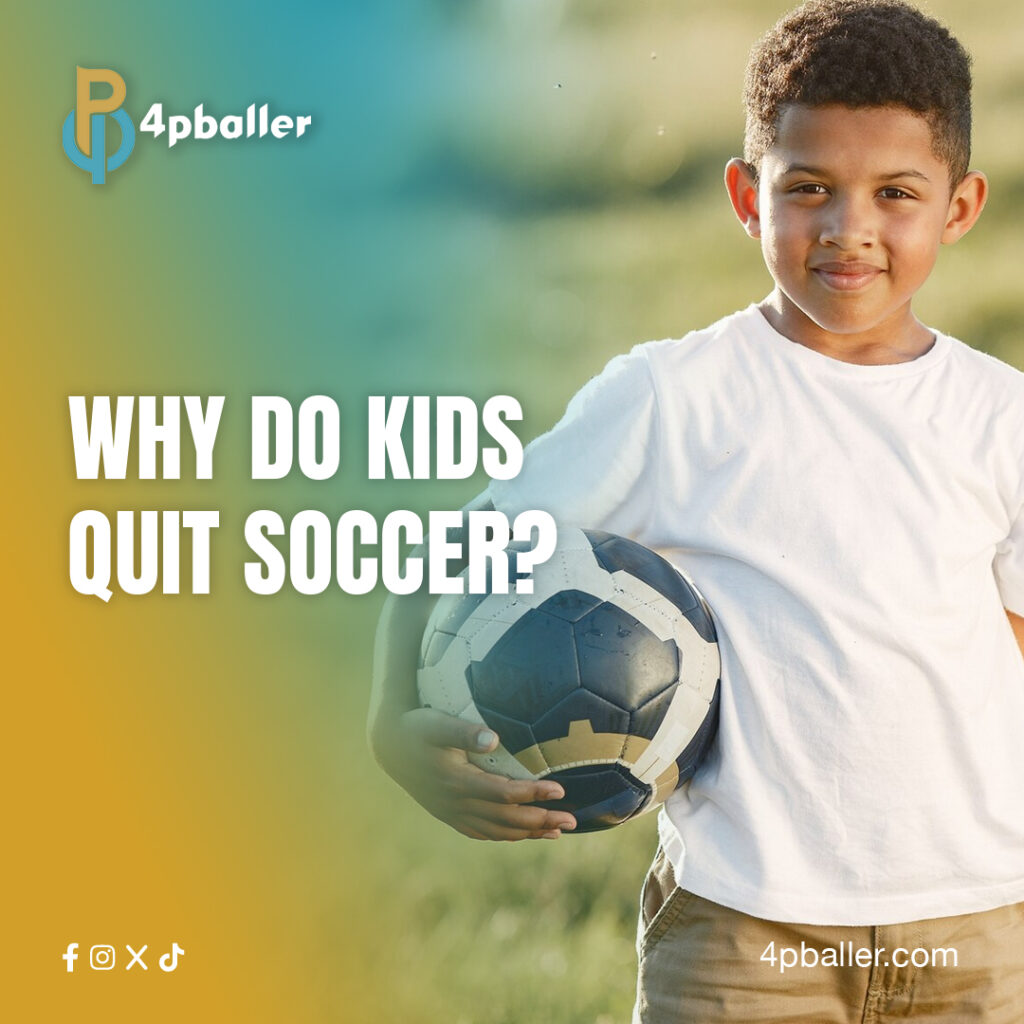Understanding the Factors Behind Youth Dropout
Soccer is a beloved sport that attracts many young participants due to its fun and team-oriented nature. However, as children grow older, there is a noticeable trend of them leaving the sport. This phenomenon is not unique to soccer; it occurs across various youth sports. Understanding why kids quit soccer involves examining the complex interplay between enjoyment, competitiveness, and external pressures.
Key Factors Influencing Dropout Rates
- Decline in Enjoyment:
- Primary Reason: The main reason children quit soccer is that it stops being fun. When the playful aspect of the game is overshadowed by stress and pressure, children lose interest.
- Stressors: High stress levels due to an overemphasis on winning, poor relationships with coaches, or excessive pressure from parents can diminish enjoyment.
- Balance Between Activities:
- Competing Priorities: As children age, they must balance sports, academics, and personal interests. Changing priorities often take precedence over the commitment required for organized sports like soccer.
- Time Management: Juggling schoolwork, soccer practices, and other commitments can be challenging. Effective time management is crucial to avoid burnout and academic neglect.
- Coaching and Team Dynamics:
- Coaching Styles: Coaches who lack positive reinforcement or fail to create an inclusive environment can inadvertently cause children to feel undervalued and opt to quit.
- Team Inclusion: Fair playing time and a sense of belonging within the team are essential for a child’s continued participation.
The Role of Youth Sports Culture
Youth sports culture has evolved, reflecting broader societal trends and attitudes towards childhood development and competitive play.
- Developmental Stages:
- Early Years: Sports serve as a means to develop motor skills and social interaction.
- Later Years: The focus shifts towards skill refinement and structured competition.
- Early Specialization vs. Diverse Participation:
- Specialization Risks: Early specialization in a single sport can lead to increased injury risk and psychological stress.
- Diverse Participation Benefits: Engaging in various sports offers a broader range of skills and potentially avoids burnout.
Physical and Mental Health Benefits
Soccer offers numerous physical and mental health benefits, including:
- Physical Health:
- Cardiovascular fitness
- Muscle strength
- Coordination and flexibility
- Mental Health:
- Lower stress levels
- Enhanced mood
- Better concentration
- Social Development:
- Teamwork
- Communication
- Leadership
Injury Risks and Prevention
While soccer provides many benefits, it also carries risks of injuries, such as sprains, strains, and concussions. Prevention measures include:
- Proper warm-up and cool-down routines
- Use of protective gear
- Adequate rest and injury recovery time
Parental Influence and Expectations
Parents play a pivotal role in shaping a child’s attitude towards soccer.
- Positive Reinforcement: Encouraging and supportive feedback can boost a child’s self-esteem and enjoyment.
- Negative Feedback: Overly critical or pressurizing comments can lead to anxiety and a desire to quit.
Balancing School and Soccer
Balancing educational commitments with sporting activities is crucial.
- Time Management: Developing a schedule that prioritizes both academics and soccer is essential.
- Compartmentalizing: Keeping school and soccer separate allows for full engagement in both areas without burnout.
The Role of Coaches
Coaches significantly impact a child’s soccer experience.
- Promoting Enthusiasm: Creating enjoyable and engaging training drills that celebrate progress and effort.
- Managing Team Dynamics: Ensuring fair playing time and fostering a spirit of collaboration among teammates.
Financial and Logistical Considerations
The costs and logistical demands of soccer can also influence dropout rates.
- Fees and Equipment: Registration fees, uniforms, and protective gear can be financially burdensome.
- Travel and Time Commitments: Significant travel for games and tournaments can be both financially and logistically challenging.
Navigating Changing Interests
As children mature, their interests and priorities may shift.
- New Hobbies and Friendships: Exploring different activities and social influences can lead to a reevaluation of their commitment to soccer.
- Adolescence: Physical and emotional changes during adolescence can influence their participation in soccer.
Transitioning Out of Soccer
When a young athlete decides to quit soccer, it’s important to support their decision.
- Positive Approaches: Ensuring the decision is made with autonomy and respect for their changing interests.
- Future Outlook: Encouraging an active lifestyle and applying the discipline and teamwork learned in soccer to new areas of interest.
Frequently Asked Questions
- Why do children stop participating in sports?
- Children often leave sports when the activities stop being fun, due to loss of interest or negative experiences with coaching or team dynamics.
- How do coaching styles influence a child’s decision to leave a sport?
- Overly critical or win-focused coaching styles can diminish a child’s enjoyment and self-esteem, prompting their decision to quit.
- At what age do children typically discontinue organized sports?
- Research suggests that a significant number of children quit organized sports by the age of 13.
- How can parents support a child contemplating leaving a sport?
- Parents can support their children by discussing their feelings, ensuring a balance of activities, and reinforcing that sports are about personal growth and enjoyment.
Understanding the multifaceted reasons behind why kids quit soccer can help parents, coaches, and sports organizations create a more enjoyable and sustainable environment for young athletes.

